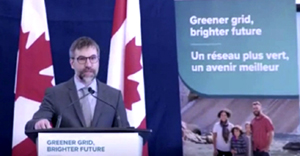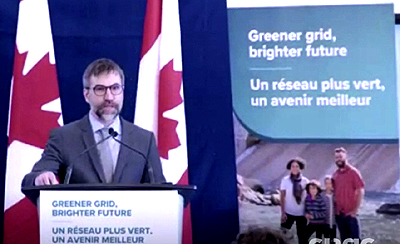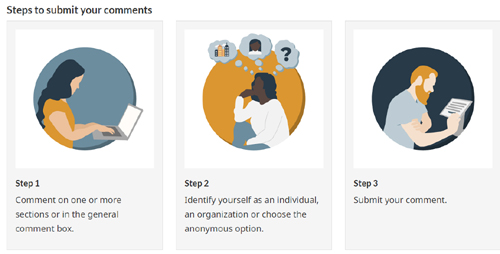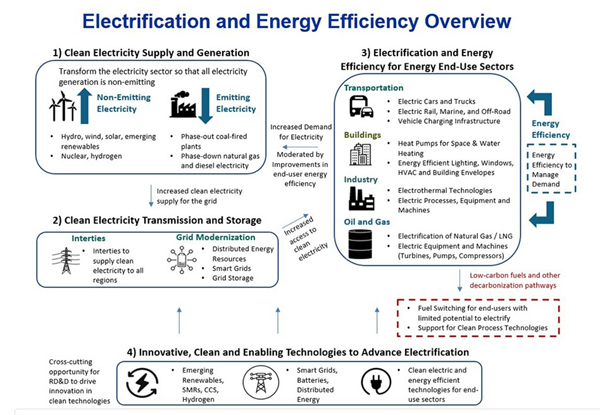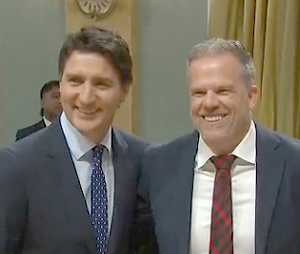Friday August 11, 2023 | NATIONAL (published from VICTORIA, BC)
by Mary P Brooke | Island Social Trends
BACKGROUND: PROPOSED CLEAN ELECTRICITY REGULATIONS
Proposed new regulations for reducing fossil fuel emissions were announced this week by Environment and Climate Change Canada (ECCC).
The August 10 announcement by ECCC Minister Steven Guilbeault has come in the slower part of summer news coverage, but the impact for people’s lives and health, businesses and communities is significant for decades to come.
“This is an exciting day,” said Guilbeault in his opening remarks at the announcement in Toronto. He said “keep the creative and innovative ideas coming, we will need your energy and creativity to reach net-zero by 2050” and said that his announcement represents a “giant step forward” for Canada to reach the clean energy targets agreed to by Canada at a recent COP.
Stakeholder & individual public input:
The proposed Clean Electricity Regulations were developed in close consultation with provinces and territories, Indigenous peoples, and a wide range of stakeholders, including utilities, electricity experts, and environmental organizations.
August 19 marks the beginning of a 75-day public consultation process (to approximately the end of October). Final regulations are expected in 2024.
Federal departments and agencies allow interested groups, individuals, and Canadians to review and comment on proposed regulations published in Part I of the Canada Gazette before they become official.
Individuals can comment on proposed regulations found in the open consultations section. Once the consultation period is over, submitted comments will be viewable in the closed consultations with published comments section.
Electrification is the key:
One of the most important ways of reducing emissions is by electrifying more parts of the economy that currently rely on fossil fuels, such as transportation, home and water heating, and industrial activities.
In Canada, the government reports that 84% of electricity comes from sources such as hydroelectricity, solar, wind, and nuclear, which are far less polluting than electricity generated from unabated (no carbon capture and storage) coal, oil, and natural gas.
“As Canada aims to achieve a net-zero emissions economy by 2050, its electricity supply will need to at least double by then, according to recent studies,” as stated on the ECCC website.
“Meeting this surging demand, while avoiding an increase in greenhouse gas emissions from the electricity sector, makes this a critical time to put in place the Clean Electricity Regulations (CER).”
Pitching to youth for innovation:
Guiltbeault said that innovation and research will help develop ideas in groundbreaking and society-changing technology, as part of the solution to controlling the emissions that exacerbate warming of the planet’s temperatures.
He hopes that youth will be inspired to “develop skills and expand knowledge” toward a future with “clean, affordable and reliable energy and good jobs without creating greenhouse gas pollution”.
The proposed regulations recognize “all major economies” and the “decarbonization of transportation, building and industrial processes by 2050”, said Guilbeault.
In his opening remarks Guilbeault recognized the Victoria-based Canadian Renewable Energy Association and students at the University of Toronto.
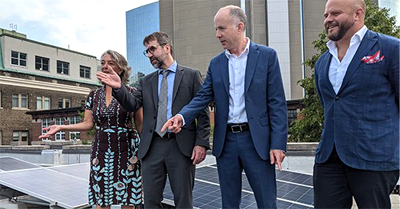
Already one of the cleanest grids:
“Canada starts from a position of strength. Our electricity grid is already one of the cleanest in the world, with more than 84 percent of electricity generated from non-emitting sources like hydro, nuclear, and wind. The draft regulations will ensure we decarbonize the remainder of our grid, while meeting the needs of increasing demand for electricity. As drafted, they would cut over 340 megatonnes of greenhouse gas pollution between 2024 and 2050.”
Pushback from Alberta and Saskatchewan:
Provinces where fossil fuels are the backbone of the economy (notably Alberta and Saskatchewan) are not surprisingly against the proposed new regulations that federal officials say the regulations would drive up the cost of energy slightly, but would be offset by the savings expected to come from moving away from fossil fuels.
Tax credits:
The government plans to cover up to half of the cost of the regulations through tax credits, low-cost financing and other funds, which could mean even less cost is passed onto consumers, Guilbeault said at a press conference in Toronto yesterday.
More than $40 billion in new tax credits and other major federal investments will help drive even more economic opportunities through the construction of new power sources and retrofitting of existing plants.

Investments can be made early:
By implementing the CER now, necessary investments can be made early, to help transition Canada to a net-zero electricity grid starting in 2035 and ensure Canadians can still enjoy a reliable and affordable electricity system.
Three principles:
The proposed regulations were developed around three core principles:
- maximize greenhouse gas reductions to achieve net-zero emissions from the electricity grid by 2035
- maintain electricity affordability for Canadians and businesses
- maintain grid reliability to support a strong economy and meet Canada’s growing energy needs
The CER is an integral part of Canada’s 2030 Emissions Reduction Plan to help the country reach its emissions reduction target of 40% to 45% below 2005 levels by 2030 and net-zero emissions by 2050.
“A clean electricity grid will be the backbone of a prosperous, low-carbon future,” says ECCC.
Environment and Health ministers:
Not at the announcement but contributing their ministry input were Jonathan Wilkinson, Minister of Energy and Natural Resources and Health Minister Mark Holland.
“Bringing clean, reliable, and affordable power to every region of Canada is an enormous undertaking,” said Jonathan Wilkinson, Minister of Energy and Natural Resources in a news release.
“It is a nation-building project that requires significant investments, thoughtful regulations, and our fullest collaboration. Today’s announcement brings us one step closer to achieving a clean electricity system for the benefit of all Canadians. We look forward to hearing from provinces and territories, Indigenous partners, and all Canadians during the consultation period of this draft regulation to ensure that it provides the certainty that Canadians want, and the emissions reductions that we must achieve,” said Wilkinson.
“With a thoughtful, comprehensive, and collaborative approach, we can ensure that every region of Canada thrives in the global race to fight climate change and seize the economic opportunities of a low-carbon future. That will continue to be our focus as we move forward,” Minister Wilkinson said in the August 10 news release.
“Cutting pollution in our communities is good for our climate, health, well-being, and economy. Our government is taking real action to fight climate change and improve air quality. Moving to a net-zero electricity grid means cleaner air and healthier communities across Canada,” said the relatively new health minister, Mark Holland, in yesterday’s government news release.
Still aiming for 2025 federal election:
Former Liberal house leader, Holland became Health Minister on July 26, 2023 during the cabinet shuffle that saw most of Prime Minister Justin Trudeau’s cabinet juggled around as a refresh heading toward the next federal election.
Gilbeault was at an international environment conference during the July 26 cabinet shuffle, clearly holding the prime minister’s full confidence.
The next federal election is — by most accounts — still expected to be held off until 2025. That’s to the advantage of both the Liberal government and the NDP who have a Supply and Confidence Agreement that can hold the Liberal minority government together until June 2025 ahead of the currently scheduled federal election in October 2025.
===== LINKS:


